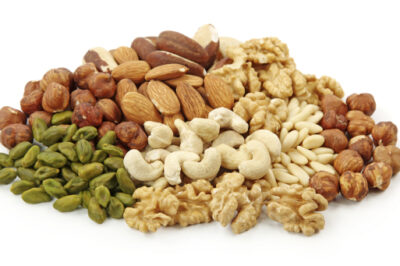A growing number of studies are giving a whole new meaning to the term “health nuts.” Researchers across the country are linking daily consumption of nuts to a lower risk for developing cancer, in addition to heart disease and other conditions.
A series of studies presented at this month’s Experimental Biology 2015 conference in Boston suggest that walnuts and other nuts hold a great deal of promise in promoting health and longevity—adding to a body of evidence that includes more than 150 similar studies.
The likely culprits are active ingredients in nuts—such as alpha-linoleic acid (ALA), a plant-based omega-3 fatty acid, protein, vitamins E and B6, and nutrients like folate, selenium, magnesium, and antioxidants called polyphenols—that boost health.
Among the latest study findings:
Colon cancer: For the first time, researchers reported that components of nuts have an effect on colon cancer cells. Research conducted by the Department of Nutritional Science and Food Management at the Ewha Womans University in Korea showed that walnut extract significantly slowed the survival of the cancer stem cells. The results suggest walnut consumption could be a helpful adjunct to standard colon cancer therapies.
Cardiovascular health: Medical specialists with the Departments of Nutrition and Internal Medicine at the University of California-Davis found postmenopausal women with high cholesterol who ate nearly two ounces of nuts a day had notable improvements in blood-vessel function—a measure of overall heart health—likely due to the polyunsaturated fatty acids they contain.
Age-related brain disorders: Scientists with the Human Nutrition Research Center on Aging at Tufts University found that laboratory rats fed a diet that included nuts had notable beneficial protective effects on critical regions of the brain tied to memory, cognition, and mental functions. Although the study involved animals, researchers believe the same mechanisms are at work in human brains.
Digestive health: A study by the Department of Physiology School of Medicine at Louisiana State University Health Sciences Center found nuts have a marked effect on “healthy bacteria” in the gut that boost digestive health and overall wellness. In fact, a daily diet including about two ounces of walnuts were found to change “the gut microbial environment, by which walnuts may exert their beneficial health effects.” Those changes boost the body’s ability to digest and use the food we eat, lowering the risk for a range of chronic diseases.
“These findings help advance the understanding of the many advantages of eating walnuts as part of a healthy diet, and add to the more than 159 published papers over 20 years that have shown how walnuts affect heart health, diabetes, cancer, cognition, fertility, and weight management,” said Dennis A. Balint, CEO of the California Walnut Commission—a health research agency of the State of California.
In addition to the recent study findings presented at the Boston conference, food scientists from the University of Scranton recently reported walnuts have the highest amount of polyphenols of nine nuts they tested—including pistachios, pecans, Brazil nuts, peanuts, almonds, macadamias, cashews, and hazelnuts—and two kinds of peanut butter.
Joe Vinson, a chemist who led the new study, said it takes only about seven walnuts a day to maximize their health benefits.
“[Walnuts] are high in fiber, low in saturated fats, high in beneficial unsaturated fats, and very high in antioxidants,” he said. “Nuts are a nutritious snack and food additive providing both nutrients and bioactive antioxidants which provide significant health benefits.”
Penn State researchers also reported last month that including peanuts—or a smoothie made from them—as a part of a high fat meal helps to control dangerous blood fats known as triglycerides, improve blood vessel function, and boost overall heart health.
“Peanuts are a healthy snack when eaten as part of a healthy diet,” said lead researcher Xiaoran Liu, a graduate student in the Department of Nutritional Sciences at Pennsylvania State University.
“Previous studies have shown that individuals who consume peanuts more than two times a week have a lower risk of coronary heart disease. This study indicates that the protective effect of peanut consumption could be due, in part, to its beneficial effect on artery health.”
In addition, a series of large studies publishes this year—including the Nurses’ Health Study of 76,464 women, the Health Professionals Follow-Up Study of 42,498 men, and a clinical trial in Spain involving people who ate a Mediterranean diet supplemented with extra nuts—have all found that the more nuts people consume, the less likely they are to die from cancer, heart disease, or stroke.
In line with these findings, the U.S. Food and Drug Administration endorses the consumption of nuts as part of a daily diet to boost cardiovascular health.
“Scientific evidence suggests but does not prove that eating 1.5 ounces per day of most nuts as part of a diet low in saturated fat and cholesterol may reduce the risk of heart disease,” the FDA says.
For the original article, visit newsmaxhealth.com.








Leave a Comment
You must be logged in to post a comment.